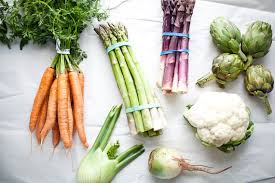We made it! Spring is finally here and those comfort food cravings are starting to subside. One of the best parts about Spring are the light and crisp fruits and vegetables that come into season. Today we are sharing some of our favorite Spring produce and of course, a delicious Spring salad recipe that incorporates all of them.
1. Artichokes: Artichokes contain a biologically active chemical called cynarin which stimulates the gallbladder to produce and release bile. Bile helps us to digest fats and absorb the vitamins from our food. Bile also helps to remove toxins, protecting our livers.
2. Arugula: You may have been enjoying arugula salads year round, but Spring is its time to shine. Arugula, along with all cruciferous vegetables contain a compound called sulforaphane which can inhibit an enzyme known to be involved in the growth of cancer cells. Arugula is also high in vitamin K which is important for bone health and improves the absorption of calcium.
3. Asparagus: Although asparagus doesn't have the sexiest rep due to the smell it causes in urine, it has a wealth of other health benefits that make us look past that detail. Along with being loaded with fiber, antioxidants, and vitamins A, C, and E, asparagus also may boost our cognitive functioning. Asparagus contains folate (like other leafy greens) which works with B12 (found in meat) to prevent against cognitive impairment. Note: the body's ability to absorb folate declines after age 50 so it's important for those over 50 to eat their greens!
4. Apricots: Apricots are one of our favorite salad additions because of their boost of color and sweetness. These little guys are rich in catechins, a particular class of flavonoid phytonutrients that have anti-inflammatory effects in the body. They are also rich in carotenoids and xanthophylls (tongue twisted yet?) which are nutrients that protect our eyesight. While dried apricots are great for sweetness, we recommend the real deal to avoid a sugar overload in your salad.
5. Fennel: Fennel is high in vitamin C which helps with iron absorption to prevent anemia and also boosts the production of collagen to keep our skin looking young and plump. It also is a great source of potassium, an electrolyte that can lower blood pressure.
Now let's put all these Spring fruits and veggies to work.
Spring Salad Recipe: (serves 2-4)
Ingredients:
- 5 cups arugula
- 1 small bunch asparagus spears, trimmed and cut into thirds on the diagonal
- 1 cup artichoke hearts, quartered (can buy canned or frozen)
- 3 apricots, sliced into quarters
- 1 small fennel bulb, sliced
- Shaved pecorino (optional)
Dressing:
- 3 tablespoons olive oil
- 1 teaspoon lemon zest
- Juice of 1 lemon
- Salt and pepper to taste
Directions:
- Wash, slice and prepare all of the ingredients
- Saute the asparagus in 1 tablespoon of olive oil on medium-low until tender. Sprinkle salt to taste. Slice spears into thirds
- Saute or grill the fennel to release a sweeter flavor, or opt to toss it in raw
- Whisk together dressing ingredients in a small bowl
- Mix all ingredients into a bowl and lightly toss the dressing. Option to garnish with pecorino cheese and serve!







